WireGuard vs. OpenVPN: Best Protocol for Online Privacy?

Bisma Farrukh
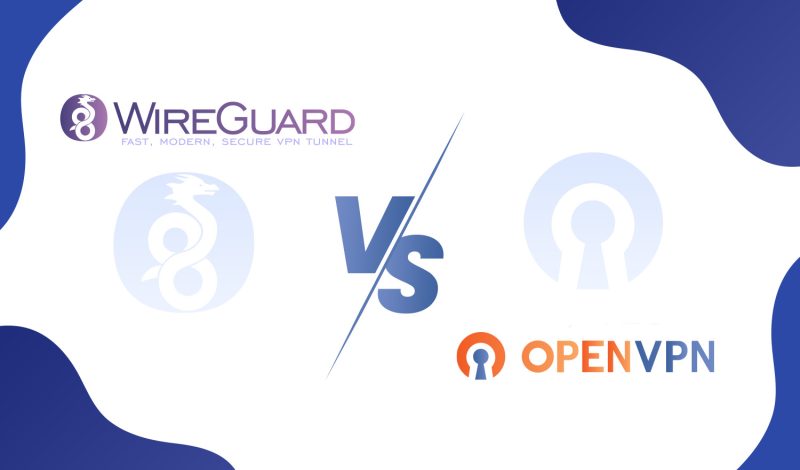
With its introduction in 2001, OpenVPN has become the de facto standard for protecting users’ anonymity and data integrity over the Internet.
On the other hand, WireGuard, a new VPN tunneling protocol that debuted in 2019, promises to improve upon all of these aspects. Some speculate that it may be the beginning of the end for OpenVPN. But this is an overly basic take because, in some cases, the 20 years older VPN protocol works better than its more modern counterpart.
To understand the idea, we’ll investigate what sets apart each of these open-source VPN protocols to help you pick the right one for your needs. This involves analyzing how well their encrypted communications perform over long distances and how they try to evade discovery in countries with tight digital control. However, before we get started, let’s quickly review each of these:
Table of Contents
Background of OpenVPN vs Wireguard
OpenVPN and Wireguard are two of the most popular VPN protocols, but which one is right for you?
OpenVPN has been around since 2001 and is open-source software used to establish a secure point-to-point or site-to-site connection over the internet. It uses a custom security protocol that utilizes SSL/TLS for key exchange and AES encryption for data transfer.
Wireguard, on the other hand, is a newer open-source software VPN protocol released in 2016. It is designed to be faster, simpler, and more secure than IPsec and OpenVPN. Wireguard uses state-of-the-art cryptography with Curve25519 for key exchange, ChaCha20 for encryption, and Poly1305 for data authentication.
Both are great options if you want to encrypt your internet traffic and hide your online activity. OpenVPN may be slightly easier to set up but Wireguard is faster. For most casual users, either protocol should work well and provide adequate security and privacy. If speed is most important, lean towards Wireguard. For maximum compatibility across devices, OpenVPN is a good choice.
What is WireGuard?
WireGuard represents a cutting-edge improvement to VPN technology. It is a free and open-source virtual private network (VPN) protocol developed by Jason Donenfeld. The new technology is designed to be more secure and efficient than previous VPNs. The protocol’s superior encryption, lightning-fast speeds, and fewer lines of code have led it to become the de facto standard for VPN connections. This streamlined code is what gives WireGuard its primary features, like easy implementation and auditing and better resource utilization.
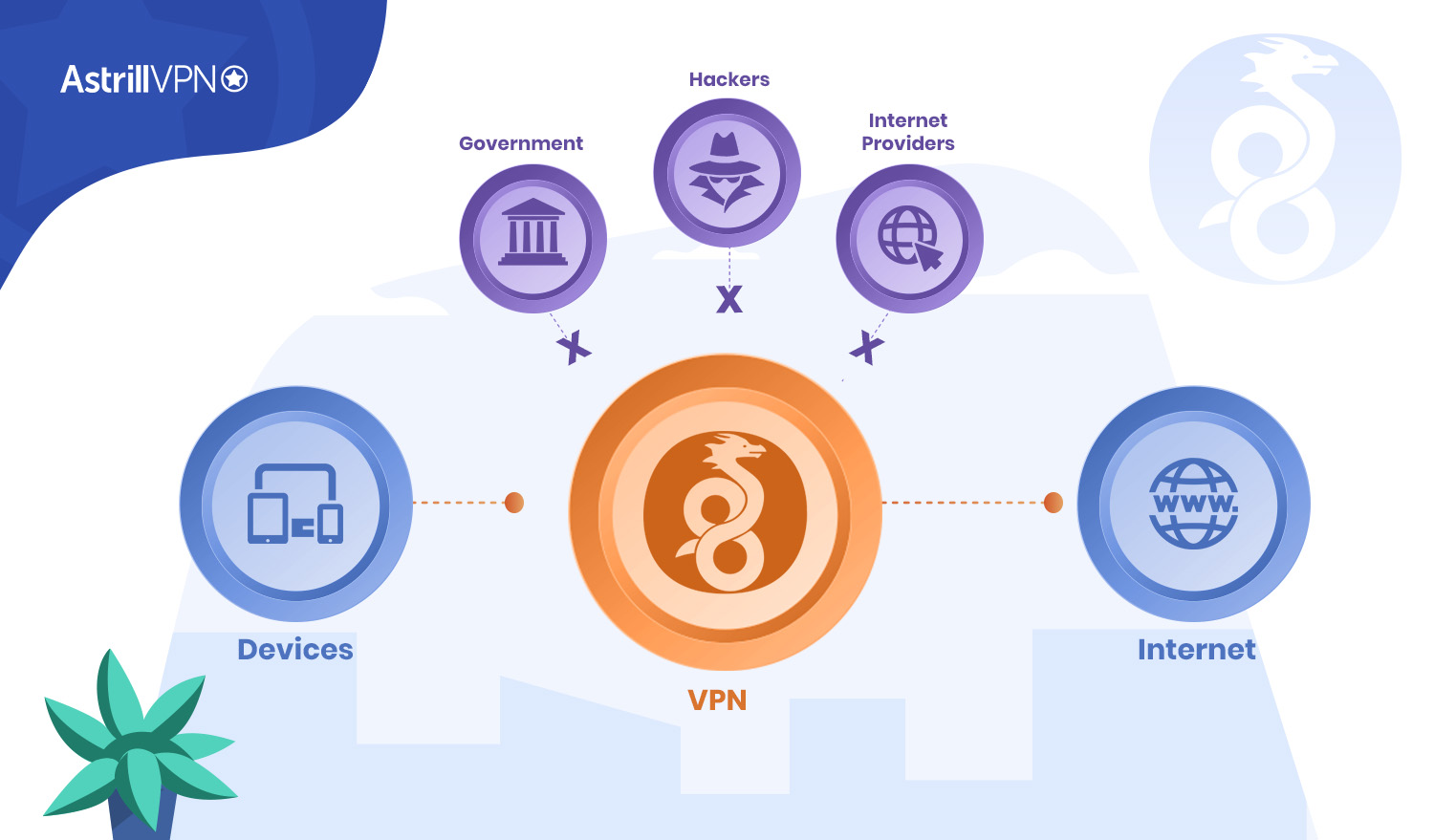
Pros
- In most cases, it’s also the quickest VPN protocol.
- Less battery power is needed to run it.
Cons
- There has been less extensive testing of the protocol because it is newer.
- Firewalls can readily detect and stop traffic.
What is OpenVPN?
OpenVPN is one of the oldest and most used VPN protocols. It has been the standard connection type for the last twenty years due to its versatility and trustworthiness. OpenVPN is an open-source VPN protocol that can be used with a VPN application and can also be configured manually on your system.
OpenVPN constructs reliable and encrypted communication between the client and the server using UDP or TCP protocols.
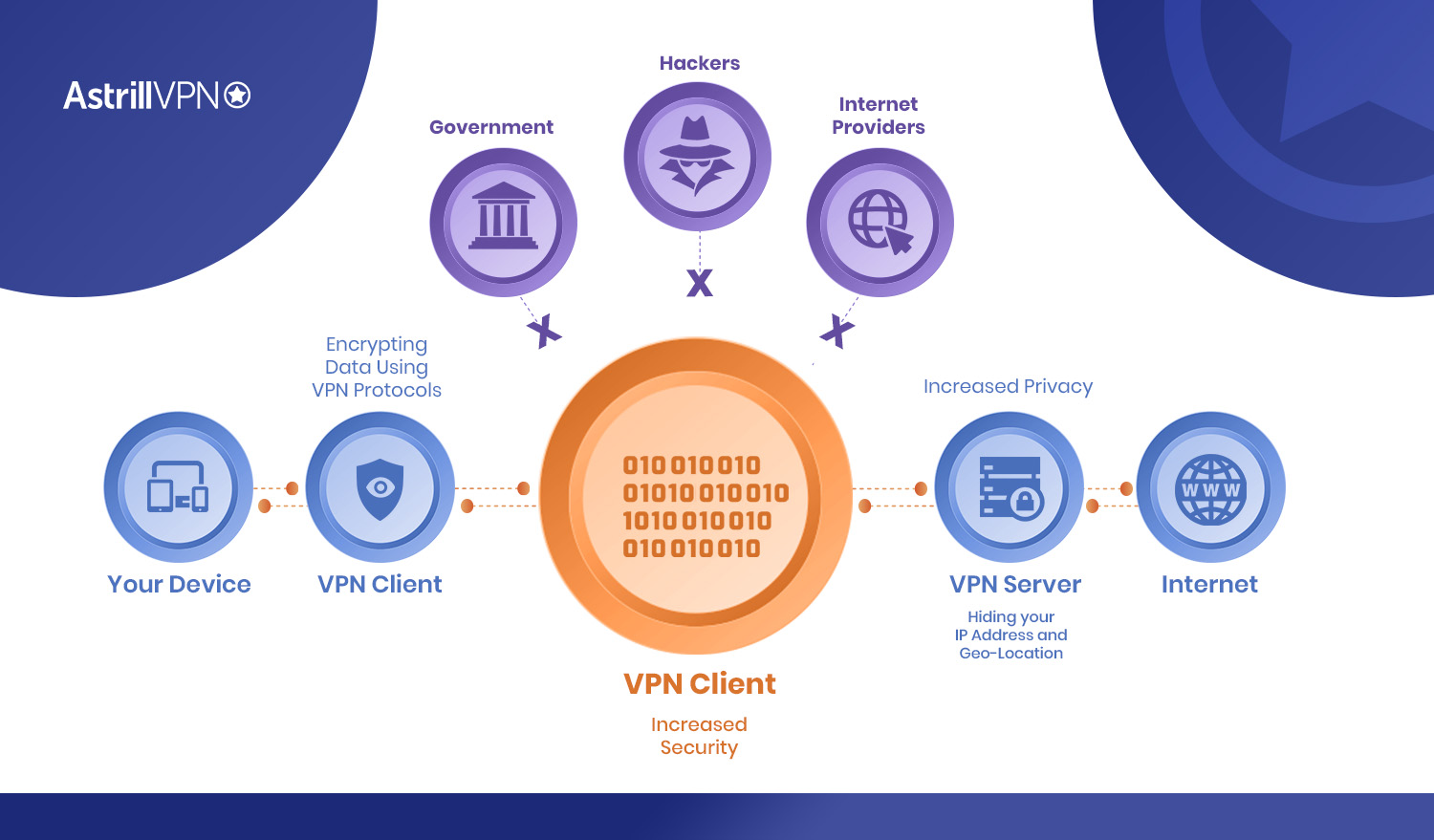
Pros
- Because of the protocol’s adaptability, it can be used with any system outside iOS.
- Its data transmissions can be encrypted to circumvent restrictions placed on virtual private network connections.
Cons
- Having a codebase that is less regularly changed and, therefore, more difficult to audit.
- Users may have connection problems while switching between WiFi and mobile networks.
Difference Between WireGuard vs. OpenVPN
| Features | WireGuard | OpenVPN |
| Speed | Faster performance | Generally slower than WireGuard |
| Privacy | May offer lower privacy levels | Noted for providing higher privacy levels |
| Encryption | Mandates specific encryption methods | Allows users to choose encryption algorithms |
| Design Philosophy | Emphasizes simplicity and efficiency | Known for its versatility and compatibility |
| Compatibility | Limited compatibility with some systems | Widely compatible with various devices |
| Data Overhead | Smaller data overhead | Higher data overhead may impact efficiency |
| Key Exchange | TLS/SSL | Curve25519 |
| Transport Layer | It only Supports UDP, making it impossible to use TCP port 443 | It supports both UDP and TCP, which allows for a configuration on TCP port 443. |
Comparison: OpenVPN vs. WireGuard
Now that you know the basics of each, we’ll compare WireGuard and OpenVPN more closely in the following aspects:
Speeds
To determine which VPN protocol is faster for you, it’s best to test them yourself. Here are the steps to test openvpn vs wireguard speeds:
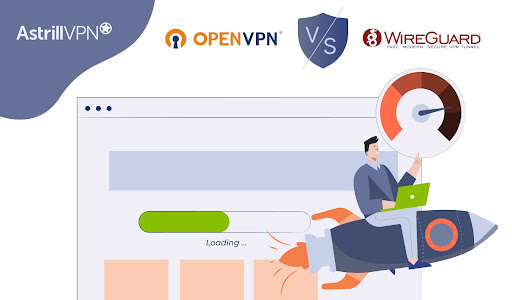
Find test servers
Look for OpenVPN and Wireguard test servers located near you. The closer the server, the faster your speeds will be. Many VPN providers offer dedicated test servers for this purpose.
Run multiple speed tests
Run several speed tests for both OpenVPN and Wireguard. Use a service like Speedtest, Fast, or your VPN provider’s own speed testing tool. Compare the download, upload, and ping speeds. Do multiple tests for each protocol and take the average, as speeds can vary.
Try different protocols
OpenVPN offers UDP and TCP protocols, while Wireguard only uses UDP. Test OpenVPN using both UDP and TCP to see which is faster for you. UDP is typically faster, but TCP can be more stable.
Consider your needs
Think about how you primarily use the VPN. If fast download speeds are most important for streaming or torrenting, choose the faster protocol. If stability and reliability matter more for general web browsing, go with the more consistent option.
By thoroughly testing the speeds of OpenVPN and Wireguard, you can determine which VPN protocol works best for your needs and connectivity. Keep in mind speeds can vary based on factors like time of day, so retest every few months to ensure you’re using the optimal protocol. Choose the one that strikes the right balance of speed and stability for you.
Encryption
For security, OpenVPN relies on the OpenSSL library. A wide variety of cryptographic methods are available within OpenSSL’s framework. Because of its algorithmic diversity, OpenVPN is agile and adaptable. Essentially, the code can discuss the appropriateness of using various algorithms. This adds a great deal of flexibility to OpenVPN but also increases the code complexity. Because of OpenVPN’s complexity, some users consider switching to WireGuard as an alternative.
When it comes to cryptographic techniques, WireGuard’s perspective is very different from that of OpenVPN. Unlike OpenVPN, which supports a wide variety of encryption techniques, WireGuard always sticks to the same set. When comparing OpenVPN with WireGuard, it’s important to note that OpenVPN uses certificates for authentication and encryption, whereas WireGuard does not. For these purposes, WireGuard employs public key encryption. Automatic secure key generation and maintenance saves time and effort and pre-sharing a key increases security.
Security
For different reasons, WireGuard and OpenVPN offer comparable levels of security.
OpenVPN has the edge over other protocols because it supports a wider variety of encryption algorithms. Although adaptability has its advantages, it also comes with the danger of poor implementation, which could result in security holes.
Although OpenVPN has been around for almost 20 years, it is still considered the safest VPN protocol. This is partly because Edward Snowden’s leaks from 2013 showed that the NSA could circumvent most VPN protocols, including OpenVPN if a previously shared key were utilized.
On the other hand, WireGuard has a few advantages of its own. For starters, it’s more up-to-date than OpenVPN. It has fewer security flaws than OpenVPN due to its usage of more contemporary encryption algorithms supported by security experts. It offers a smaller attack surface than OpenVPN since it employs less code, which means there are limited chances for hackers to exploit it. Furthermore, if a vulnerability is discovered in any cipher or algorithm, in that case, all endpoints are immediately compelled to update to a new version, ensuring that nobody is using the compromised WireGuard code.
Auditability
Privacy advocates prefer open-source VPN protocols because they can be verified. But just because something is open source doesn’t mean auditing it is easy. OpenVPN has passed more audits than any other open-source VPN technology, but its massive size makes it challenging to implement. When auditing a codebase the size of OpenVPN, it takes a team quite a while to do so correctly.
The WireGuard protocol is also open-source and thus auditable. WireGuard is around 1% as long as OpenVPN, although it only has 6,000 lines of code. Because of this, it will likely replace OpenVPN as the most extensively audited VPN protocol. WireGuard allows a single engineer to audit the code in hours rather than the days it would take a team.
Privacy
Comparing both protocols is hard because WireGuard and OpenVPN are reliable and highly secure VPN protocols. Both of these protocols mask your IP address and DNS and provide AES 256-bit encryption.
WireGuard is designed in a way that it keeps the user’s IP address on the VPN server. Once you reboot your system, its crypto key routing algorithm flushes the user data stored on the VPN server. This is one of the downsides of WireGuard when it comes to online privacy. If your VPN server gets compromised, your IP can also leak. Though it is nearly impossible, this stands out as a weak link.
This issue can be negated by using AstrillVPN’s WireGuard protocol. The reason it’s better to use WireGuard on Astrill is that AstrillVPN has a strict no-logs policy, which is why the chances of being vulnerable get lowered more.
On the other hand, OpenVPN provides the same level of privacy when used through a VPN app or configured manually. This protocol consistency is why many people prefer to use OpenVPN more.
Ease of Use
Both VPN protocols have their unique pros and cons regarding the end of use and configuration. One thing is that
Wireguard vs. OpenVPN: How Does Astrill Offer these two Protocols?
Astrill offers four different VPN protocols: Wireguard, StealthVPN, Open Web, and OpenVPN. The best thing about Astrill’s Wireguard and OpenVPN protocol is that they’re pretty easy to set up. Take a look below to learn how you can easily use either of these protocols:
WireGuard
WireGuard is a VPN protocol that uses cutting-edge cryptographic methods while remaining incredibly easy to set up and use. The best thing about Wireguard on AstrillVPN is that it can be configured very quickly, unlike other VPN providers, where you have to configure the port and MTU manually.
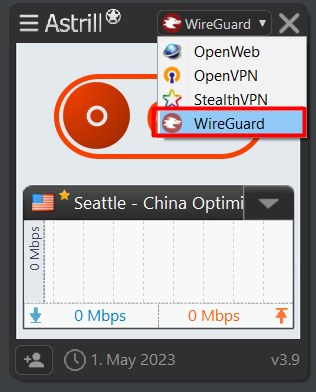
As shown in the picture, you can easily select the Wireguard protocol from the drop-down list and start using it immediately by toggling the connection ON.
OpenVPN
Astrill offers an easy-to-use OpenVPN configuration. You can easily select the OpenVPN protocol and use it without having to set up an OpenVPN connection on your device, which takes a lot of complex steps. Follow these steps to set up AstrillVPN OpenVPN protocol:
- Simply choose the OpenVPN protocol from the drop-down list
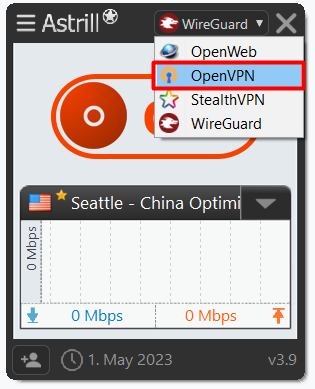
2. Now click on the menu bar on the left and select the OpenVPN options.
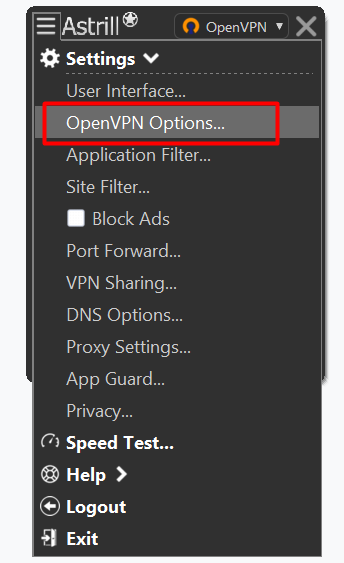
3. Set up the connection as you wish
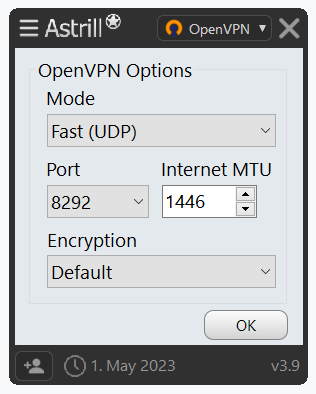
4. Now click Ok and Turn ‘On’ the VPN connection.
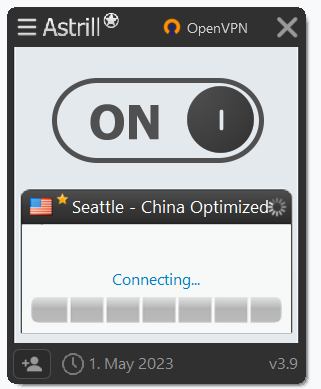
WireGuard vs. OpenVPN: VPN Device Compatibility
OpenVPN has long been regarded as a multitool for safe networking due to its flexibility. The protocol supports plugins and script hooks, allowing the server to tailor its behavior to a specific client’s request.
However, this opens the door to slower performance and heightened security risks. ChromeOS and other less common platforms and routers can establish VPN connections using this protocol.
Most VPN software users (iPhone owners in particular) will discover that OpenVPN is incompatible with iOS.
Compared to OpenVPN, WireGuard’s code base supports current devices but falls short regarding backward compatibility. In addition, WireGuard is currently only compatible with the most popular operating systems: iOS, Windows, macOS, Android, Fire TV, and Linux.
Neither system has a clear compatibility advantage over the other right now.
OpenVPN is superior to the more recent protocol in terms of the breadth of platforms it supports, but it is not compatible with Apple’s iPhone and iPad. WireGuard, on the other hand, triumphs when it comes to compatibility for all main platforms. However, it is limited to popular gadgets released during the past few years.
Advantages of WireGuard
WireGuard is a relatively new VPN protocol that has gained popularity in recent years. Many users have been switching from OpenVPN to WireGuard due to several advantages It offers.
- One major advantage of WireGuard is that it is much faster and more lightweight than OpenVPN. WireGuard uses state-of-the-art cryptography that requires fewer CPU resources, resulting in higher connection speeds. This makes WireGuard a good choice for mobile devices with limited processing power. On the other hand, OpenVPN uses older cryptography that requires more CPU resources and tends to be slower, especially on mobile.
- Another advantage is that WireGuard is much simpler and easier to configure and deploy. OpenVPN has a complex configuration with many options that can confuse users. WireGuard, in contrast, has a very straightforward configuration with just a handful of options. This simplicity means that WireGuard VPNs are often more reliable and have fewer issues.
- WireGuard also has a much smaller codebase. The entire WireGuard protocol is only around 4,000 lines of code compared to over 100,000 lines for OpenVPN. This smaller codebase makes WireGuard more secure and robust as there are fewer opportunities for bugs or vulnerabilities.
Advantages of OpenVPN
OpenVPN and WireGuard are both popular open-source VPN protocols. While WireGuard has gained a lot of hype recently for its simplicity and high performance, OpenVPN has been around longer and has many advantages. Here are some of the key differences when comparing OpenVPN versus WireGuard:
- OpenVPN has been around much longer and has a more proven track record for security. While WireGuard uses modern cryptography, OpenVPN has stood the test of time and undergone more scrutiny from security researchers.
- OpenVPN offers many more features and configurations than WireGuard. It supports a wider range of authentication methods, can run in several modes, and has many additional options for advanced users. However, this added flexibility comes at the cost of some complexity.
- OpenVPN has clients available for nearly every operating system and platform. It works with Windows, Mac, Linux, Android, and iOS. WireGuard, while available on many platforms, still has more limited compatibility compared to OpenVPN.
- While WireGuard has gained attention for its high performance, OpenVPN has improved significantly over the years and can also provide fast speeds for most users. The performance difference is often negligible for normal usage.
- Due to its simpler design, WireGuard is generally considered easier to set up and use. OpenVPN has more options, which add complexity but also customizability. For novice users, WireGuard may offer a smoother initial experience.
Which VPN Protocol Should You Choose?
Which VPN protocol you choose depends on your needs and technical skills. Let’s compare the two most popular options:
OpenVPN
OpenVPN is open-source, customizable, and works on most devices. However, it can be complicated to set up and configure. If you’re not tech-savvy, the many options may overwhelm you. Still, OpenVPN offers strong security and the ability to get around firewalls. It’s a great choice if you want full control and customization.
Wireguard
Wireguard is a newer protocol praised for its speed, simplicity, and security. It’s easy to configure and works on most platforms. However, Wireguard is still in development, so it may have vulnerabilities not yet discovered. It also lacks some of OpenVPN’s customization. Still, for most basic needs like accessing region-locked content or using public Wi-Fi safely, Wireguard gets the job done.
In the end, you need to weigh the pros and cons for your needs. OpenVPN offers power and customization for advanced users, while Wireguard provides a simple yet secure solution for casual use. Try them both to see which you prefer, but for a quick, cross-platform answer, Wireguard may be your best bet. The choice is yours!
FAQs
Openvpn and Wireguard are two popular VPN protocols, but which one is right for you? Here are some common questions to help you decide:
Is Openvpn or Wireguard faster?
Generally, Wireguard will provide faster speeds. It was designed to be lightweight and efficient, using modern cryptography standards. Openvpn is a bit more resource intensive. For most casual users, either protocol will work fine, but if max speed is important, Wireguard has the edge.
Which is more secure?
Openvpn has been around longer and is considered very secure, using strong encryption algorithms like AES-256-CBC. Wireguard uses state-of-the-art cryptography like Curve25519, but hasn’t been battle-tested as long. For extremely sensitive data, Openvpn may be slightly more secure. For typical use, both are solid options.
Which clients/devices are supported?
Openvpn has clients for Windows, Mac, Linux, Android and iOS. It also supports routers, firewalls and other devices. Wireguard has clients for major platforms too, but router/firewall support is more limited. If you need VPN for a wide range of devices, Openvpn probably has better compatibility currently.
Is one easier to set up?
Wireguard is designed to be simple to configure. The setup process only requires generating a private key and entering a few settings. Openvpn is a bit more complex, with certificates and multiple configuration files to manage. For a quick, hassle-free setup, Wireguard wins out. But Openvpn does offer more customization.
Conclusion
A virtual private network (VPN) is a good security measure, but no single protocol is superior. OpenVPN will continue to be a good option until something like WireGuard becomes widely available, simple to install on routers, and indecipherable without extra obfuscation tools.
Instead, it’s up to consumers to select the optimal method for accomplishing each given endeavor. For example, a TCP-based OpenVPN connection may be preferable if you’re having trouble bypassing geo-blocking. Using WireGuard may be the better choice if you want to maximize performance.

No comments were posted yet